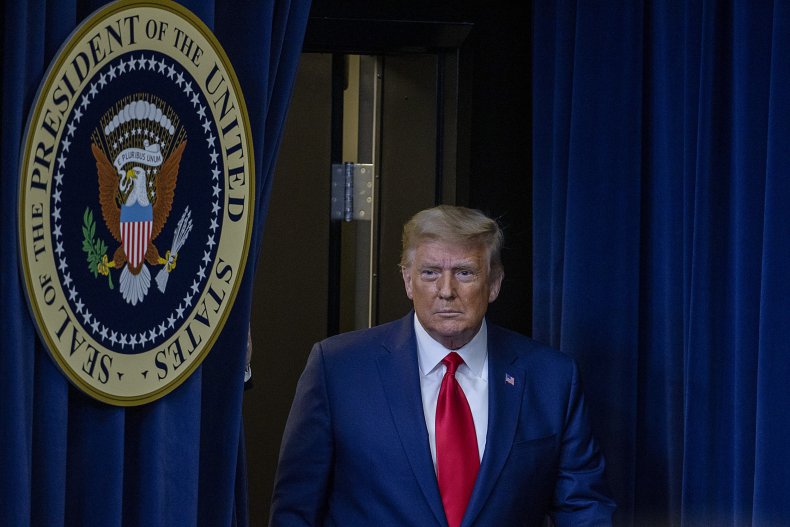Does Empeachment Prevent a President for Running Again
Can Donald Trump Run for President in 2024 if He's Impeached Again?
Donald Trump could become the first president in U.S. history to be impeached twice, but will it be enough to bar him from running for federal office again?
The House of Representatives released a resolution Monday to impeach Trump, charging him with "incitement of insurrection" after a mob of his supporters stormed the U.S. Capitol on January 6 to protest the congressional certification of President-elect Joe Biden's win. The chamber is expected to vote on the matter later this week.
Trump has received a bipartisan backlash for his role in the riot, as lawmakers argue he misled millions of people by making false allegations of voter fraud and election irregularities. In his address at the rally last week, the president said, "We will never give up, we will never concede."
Speaker Nancy Pelosi told CBS News during a 60 Minutes interview Sunday that "one of the motivations that people have for advocating for impeachment" is to block Trump from running for president again in 2024—something he's reportedly expressed interest in.
But being impeached by the House, even for a second time, is not enough to prevent Trump from seeking the White House or any other federal office in the future. That power rests in the U.S. Senate.
Article I of the Constitution authorizes the Senate to impose two punishments for a public official found guilty of articles of impeachment: removal from office and a ban on future officeholding.
According to the Senate's website, "The Constitution requires a two-thirds vote of the Senate to convict, and the penalty for an impeached official upon conviction is removal from office. In some cases, the Senate has also disqualified such officials from holding public offices in the future."
The second penalty—banning a public figure from running for office again—requires only a simple majority of 51 senators rather than the two-thirds majority needed for removal, according to The New York Times.
Such a scenario has played out three times, though none involved a president. The Senate permanently blacklisted federal judges West Humphreys in 1862, Robert W. Archbald in 1913 and G. Thomas Porteous Jr. in 2010.

Trump was impeached by the House in December 2019 on charges of abuse of power and obstruction of Congress over his dealings with Ukraine. Months earlier, a whistleblower complaint revealed Trump had threatened to withhold U.S. foreign aid money until the Ukrainian president promised to investigate Biden and his son Hunter. While the House voted 230-197 to impeach Trump, he was acquitted by the Republican-controlled Senate in February 2020.
It's unclear if the Senate Democrats will have enough votes this time around to convict Trump. The upper chamber will be split 50-50 along party lines, which means Vice President-elect Kamala Harris could cast the crucial tiebreaker vote to disqualify Trump from holding a federal office again.
But first, Democrats would need 17 Republicans to vote in favor of conviction. So far, few conservative members of the upper chamber have voiced support for impeachment. Instead, many GOP lawmakers have called for censuring Trump or asking him to offer his resignation.
Still, outgoing Senate Majority Leader Mitch McConnell circulated a memo to colleagues outlining the procedure for holding another impeachment trial. McConnell said the expected scenario, if the House impeaches Trump, is that a trial would begin in the Senate on January 20 or 21.
Newsweek reached out to McConnell's office for further comment on impeachment proceedings but did not receive a response in time for publication.
Source: https://www.newsweek.com/can-donald-trump-run-president-2024-if-hes-impeached-again-1560550
0 Response to "Does Empeachment Prevent a President for Running Again"
Post a Comment